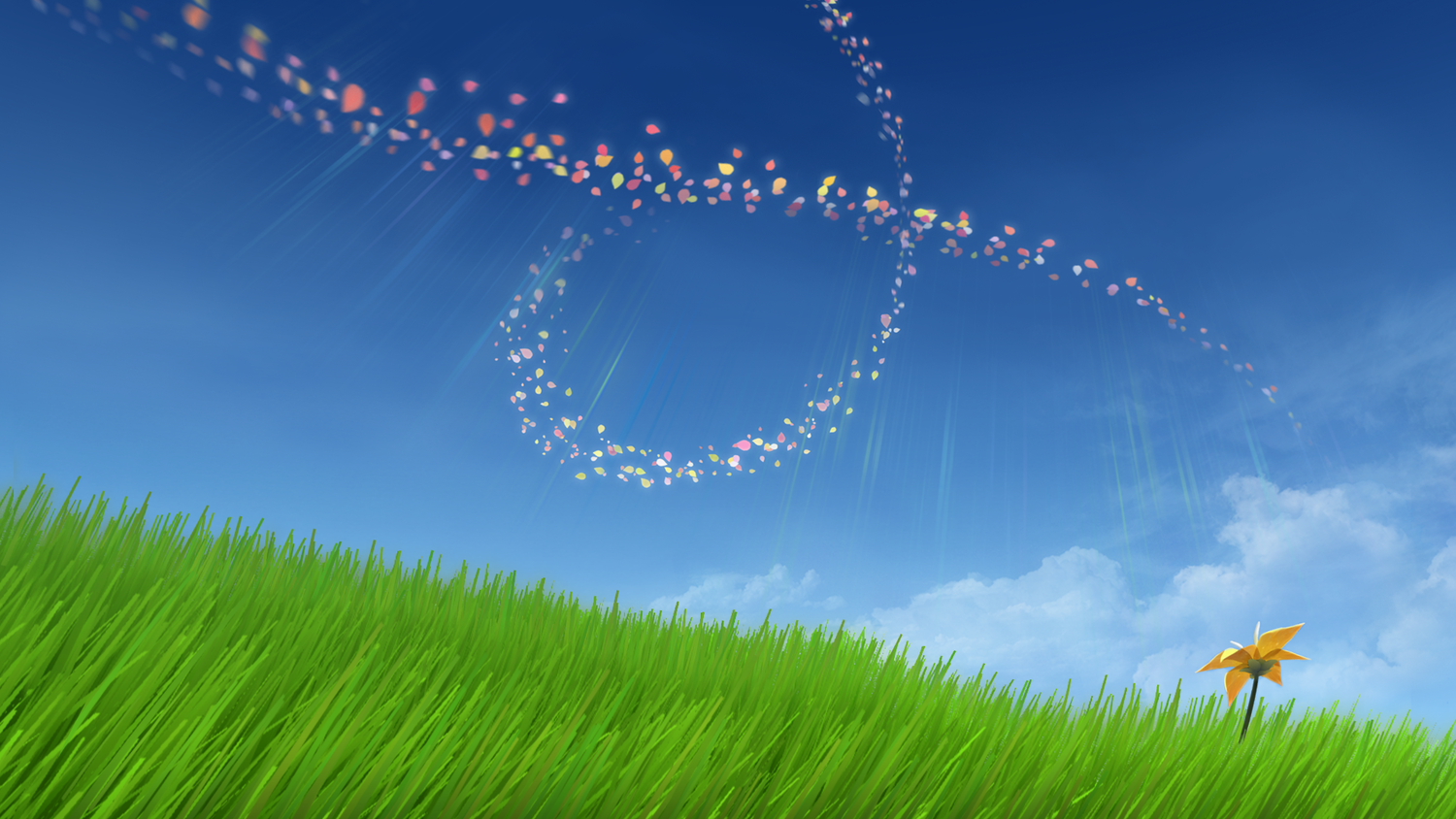Flower
Designed by Jenova Chen and Nicholas Clark, Flower is an adventurous video game created to evoke positive emotions in the player. The poetic gaming experience was brought to the market in February of 2009 and executed in partnership with Thatgamecompany and Sony Computer Entertainment. Originally released for the PlayStation 3, the game has expanded to systems including PlayStation 4, PlayStation Vita, Bluepoint Games, and most recently to the iOS system in September of 2017.
Flower gifts players with control of the wind. Players use their game controller to move a flower petal through the air. When the petal flies close to other planted flowers, a following by other flower petals is created. Approaching certain flowers may also bring positive externalities for the game world environment, including vibrant colors and life to dead floral fields and activating windmills. These changes open new opportunities for the player to interact with new flowers and environmental conditions. Similar to the real world, every action carried out by the player causes an environmental change. Upon pressing any button on the controller, the wind is blown faster and moves the petal at a faster rate. A camera primarily follows the petal’s journey from behind while also highlighting new objectives for the user as needed.
“Billed as a “video game version of a poem,” ThatGameCompany’s “Flower” transports players into a beautiful and imaginative world. In a successful fusion of romanticism and modern gaming, designer Jenova Chen brings nature to life. From the tranquility of an uninhabited grassland on a bright sunny day to the furious destructiveness of a rolling tempest, “Flower” is fantastically painted world offering a riveting yet casual experience.”
Shifting away from the traditional gaming model where players must conquer challenges in order to advance, Chen specifically created Flower to explore the emotional range within the realm of video games. Believing that positive behavior can be rewarded and monetized, Chen asserts “it’s the game designer’s job to evoke different sides of humanity.” Flower engages his audience’s emotions while working to extend the limited emotional range provided in traditional video games. The narrative is created through visuals and emotional cues and excludes any text or dialogue. Flower’s narrative arc exploits the tensions between urban development and the natural world.
(Image courtesy of Jenova Chen)
The game’s structure is composed of six main levels and one credits level. Flower is only progressive and does not allow for loss at any level. The varying levels are represented in single flower pots sitting on the windowsill in a city apartment. When a flower pot is selected, the game moves to the “dream” environment of that flower. Upon progressing levels, the city becomes noticeably more colorful and cheerful. The credits level differs from the main levels by placing the names of people involved in the game development on flowers throughout the player’s journey.
Flower is paired with music created by Vincent Diamante. Differing music accompanies each level in correspondence to the level’s placement, emotional sentiments, and player’s actions. Diamante incorporates pianos, classical guitars, bass flutes, and bassoons as instruments to create a natural wind sound. The number of instruments working together increase with the number of petals gathered.
(Image courtesy of Jenova Chen)
Chen’s artistic developments are remembered for their beautiful aesthetics and rarefied narratives. Within his most well known pieces, Flow, Flower, and Journey, Chen creates experiences for the gamer to evoke certain sentiments within. His most recent game development, Journey shares the story of a robed figure making a pilgrimage to a distant mountain, venturing through a desert in ruins. The game is designed to make the user feel small and wonder in the vast desert. Journey is multiuser game challenging the traditional gaming model where gamers feel threatened by once another. Upon encountering another player on the journey, there is no ability to communicate with them directly. Alternatively, players must form relationships through their actions and are given the options to help one another or leave. Flower and Journey are similar in their ability to connect the gamer with the virtual environment in personal ways. In both games, Chen continues to explore the emotional realm in the video game world, while touching on different areas. Flower uses positivity to demonstrate the tense relationship between nature and the urban world, while Journey challenges current means of communication and social interactions.
(Image courtesy of Ian Bogost)
Chen is not the only video game developer disrupting the market with narratives shifting from the traditional gaming model. Designed by Ian Bogost, Guru Meditation brings users into meditation with elements including a joy board or joystick. Bogost works to create a relaxing environment with changing scenery as time passes. Guru Meditation simulates the mediation experience while emulating the actions behind the practice. Similar to Flower, Guru Meditation furthers the notion that gaming can touch players in personal ways and encourage positive thought. Guru Meditation differs from Chen’s collections in the pixelated artistic environment. Rather than using mystical and extraordinary imagery, Bogost selected the older medium to highlight the relationship between historical religious practice and emerging digital technologies.
Flower is a critical success and has been very well received by the gaming community. The compelling emotional experience was awarded as the “best independent game of 2009” by Spike Video Games Award and the “Casual Game of the Year” by the Academy of Interactive Arts and Sciences. Chen has received accolades from GamePro and GameTrailers critics praises his design as less of a game and more of an experience.
Sources
https://www.gamespot.com/articles/jenova-chen-on-flower-matsuura-and-indie-development/1100-6213519/
https://www.fastcompany.com/1680062/game-designer-jenova-chen-on-the-art-behind-his-journey
http://thatgamecompany.com/flower/





![[perfect.city]](https://images.squarespace-cdn.com/content/v1/56eb27558a65e2c2a033b13c/1527019199896-NYO4GASE8CLQ70E7CRPF/Thumbnail+pic.jpg)


